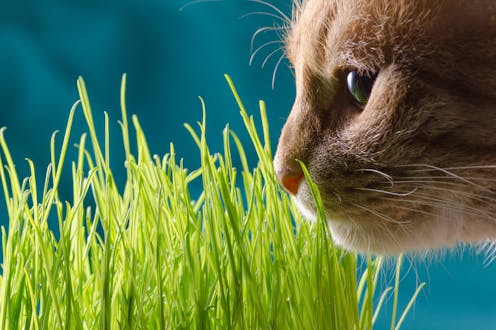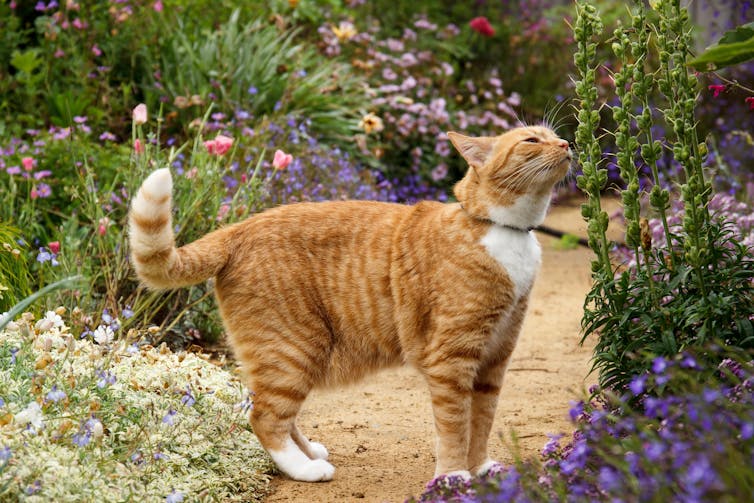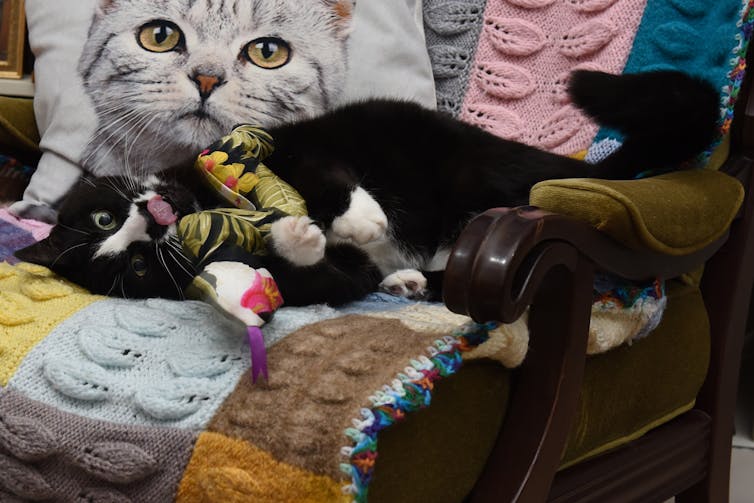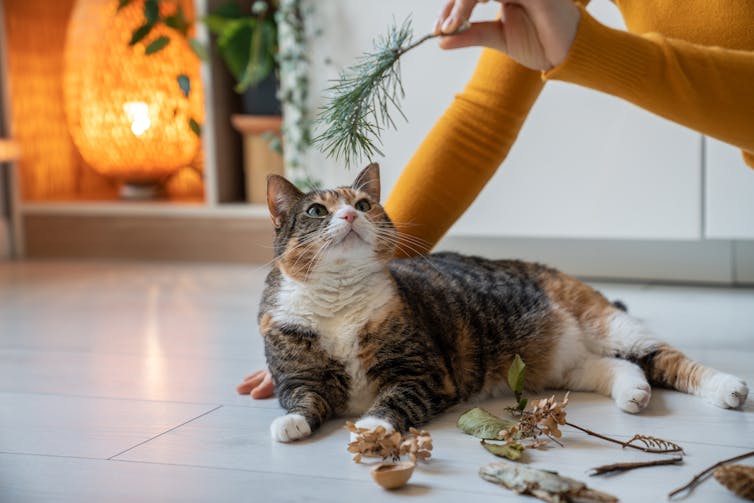
Cats kept indoors can live a good life when they get access to a variety of positive experiences. Examples include performing natural behaviours, feeling safe at home and using their full sensory capabilities, including their sense of smell.
Plants such as catnip, cat thyme and silver vine are potent smelly stimulants that can affect cat minds and moods.
Ever wondered if these mind-altering substances are safe gifts for our feline friends? And importantly, is it OK to provide these, or is offering catnip to a cat like offering alcohol to a child?

Read more: Won’t my cat get bored if I keep it inside? Here's how to ensure it's happy
Catnip, cat thyme and silver vine, oh my!
Owners who are concerned about their cats feeling bored and frustrated might offer them fresh or dried catnip (Nepeta cataria), silver vine (Actinidia polygama), cat thyme (Teucrium marum) or other plant materials such as valerian (Valeriana officinalis) and Tatarian honeysuckle (Lonicera tatarica). These last couple could offer an alternative if your cat doesn’t respond to catnip.
Toys filled with the leaves or extracts of these plants can cause apparently euphoric behaviour in domestic cats (as well as big cats like leopards and jaguars). Not all cats respond this way to these smells, which is believed to have a genetic basis.

Are these treats safe for cats?
Cats have a highly developed sense of smell. Some plants release chemical compounds to deter insects or to attract predators of insects that might otherwise destroy them. This includes nepetalactone, an ingredient isolated from catnip and silver vine.
Indeed, it has been argued that exposure to nepetalactone leads to an increase in feel-good hormones in cats. It may also act as a natural mosquito repellent (note that it does not repel all mosquitoes and is not effective for flea or tick control).
This may be why sniffing catnip, silver vine and some other plants causes cats to roll on their backs and rub their chins, cheeks and bodies on the plants. Other observed behaviours include: licking, shaking their head while carrying plant material in their mouth, drooling, kicking the plant material with their hind feet, and a “wavelike” motion of the skin over their backs as muscles contract and relax.
These responses generally don’t last long, usually seconds to minutes, before cats relax or resume their normal behaviour.
Rather than becoming addicted to these substances, cats are more likely to become habituated and desensitised, with the plants having less effect over time. When sniffed, these plants appear to have no adverse effects on cats.
Read more: What actually is catnip and is it safe for my cat?
Is it ethical to alter the minds of our cats?
When considering how to improve the lives of animals we care for, we tend to focus on whether the benefits outweigh the potential harms.
Despite some marketing claims that these plants activates the brain’s opioid system, delivering a “natural high” for cats, there is no evidence these substances actually alter the minds of cats in the same way as alcohol or other drugs alter the minds of humans.
The marketing of these cat treats as “kitty crack” or “meowijuana” and silver vine sticks as “kitty cigarettes” is likely to deter some people from offering their cats this kind of olfactory stimulation.
Unlike offering alcohol to a child, though, the evidence suggests our cats are OK when given access to these treats. These items won’t induce psychosis and won’t lead to addiction or withdrawal symptoms. And we don’t need to worry about our cats operating heavy machinery or making important decisions under the influence of mind-altering substances!
Provided they can walk away at any time, it seems reasonable to let them opt in to a fun time.
In fact, we harness the power of cats’ sense of smell in other ways by using synthetic feline facial pheromones. This can help reduce fear, anxiety and distress in cats. These substances can come in useful in settings such as multi-cat households or when moving house.

Read more: Is it unethical to give your cat catnip?
How to make sure your cat has the purr-fect time
Offering a range of smells (olfactory stimulation) is just one way to ensure your cat has a varied and interesting life. Here are some tips:
offer cats choices to interact with treats and toys – don’t force them
rotate the toys and experiences on offer, so every day offers something fresh
offer items that cats can scratch – scratching posts and corrugated cardboard are popular items
if you are concerned your cat has swallowed part of a toy or seems unwell, check in with your vet.
Given the short-lived effects of these plant-based olfactory stimulants on cats, it is important that we optimise their environment, lifestyle and interactions with humans to improve their welfare. We can’t just rely on catnip or silver vine to give our cats a good life indoors – it’s really up to us!
Anne Quain is on the NSW Committee of the Australian Veterinary Association. She is also a committee member of the Humane Society Veterinary Medical Association, the Australian and New Zealand College of Veterinary Scientists Animal Welfare chapter, the European College of Animal Welfare and Behaviour Medicine, and consults to veterinary and animal welfare organisations regarding Animal Welfare Science, Ethics and Law.
Mia Cobb does not work for, consult, own shares in or receive funding from any company or organisation that would benefit from this article, and has disclosed no relevant affiliations beyond their academic appointment.
This article was originally published on The Conversation. Read the original article.







